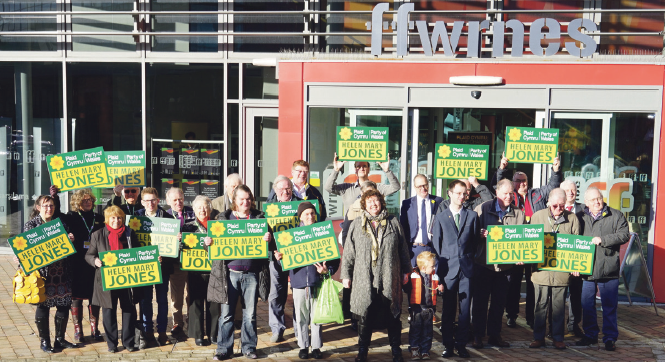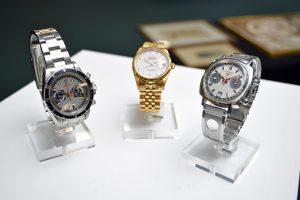
IF DAY ONE of the conference belonged to Helen Mary Jones and Leanne Wood ,then day two certainly belonged to Plaid’s Carmarthen West and Dinefwr AM candidate Adam Price.
He began by using national and local history to set the scene for what may be a hard fought battle for key seats in Carmarthenshire.
Referencing the Llanelli railway riots of 1911 he told the conference: “A hundred years ago railway workers in this town took control of the level crossings on the Great Western Railway. Eighty years before that the Daughters of Rebecca occupied the toll booths on the Carmarthenshire turnpike.
“They held the junction points of history in their own hands for a few brief moments, and risked their very lives in the process. It’s through their struggle and the struggles that followed that we are in the fortunate position as a people that we now find ourselves. For the next nine weeks the levers of our future lie in our own hands.”
Labour will lose
Looking towards the May election he told the conference : “It’s nine weeks out and not a vote has been cast but I think we can confidently make one prediction. Labour will lose in May. And they deserve to lose because they have already lost any sense of direction, any scrap of creativity, of vision, of drive.
“They have put us at the bottom of the league for prosperity, for wages, for literacy, for numeracy and science.”
History, humour and quotations ran throughout Adam Price’s speech.
He observed: “The first wonder of the world is the mind of a child… Yet we are thirty-fifth in the world league of education standards today – thirty-fifth. They say give me a boy at seven, I’ll show you the man at 70. Well give me the education system that is thirty-fifth in the world today and I will give you the economy that is thirty-fifth in the world”.
He told the conference: “That was Anthony Charles Lynton Blair in his 1996 Leader’s Speech to the Labour Party Conference, the last one as leader before he turfed out John Major.
“Well, in Wales today, 35th place, which Labour said then was a terrible indictment of a failing government, ranks above us in the same PISA league table. We are 36th in science, 41st in reading and 43rd in the world for maths.”
Adam Price asserted that Wales is poorer under Labour relative to all our neighbours, British and European, than we were when devolution began. He said : “Remember the devolution dividend. Well, we have had devolution drift and decline. We have the highest economic inactivity rate of any part of the United Kingdom. We have 360,000 people in Wales on hospital waiting lists.”
Wales CAN achieve
Referring to the record of the First Minster, Carwyn Jones he continued: “Carwyn says, of course, that he is only half way through his decade of delivery and that’s true enough. The problem is the decade’s the 1970s. We are going backwards not forwards as a nation.”
Posing the rhetorical question, Adam Price continued to enquire what future monuments there would be to mark the legacy of Carwyn Jones. He suggested the closure of Port Talbot and of Trostre, steel towns without steel, an airport without passengers, an NHS without doctors, young people without a future and a nation without hope.
Taking a positive view of the future under a Plaid Cymru government he said: “We are a talented country. Let no-one doubt what Wales can achieve. It’s not just our own history but our future and our fortune too that we can make here in Wales.
“We’ll establish a National Innovation Body to create that future economy, a new-model development agency to sell Wales across the world, a Bank of Wales to back our businesses, an Infrastructure Commission to lay the foundations of our prosperity not just in one corner of our country, but throughout the land, led not by a Costa Bureaucratica in Cardiff Bay but a new partnership between people, from every sectors and walk of life, who have the knowledge and experience we need and the ordinary commitment that each of us can give to our country.
“We will create a sense of national mission the likes of which we have not seen in generations – to educate the young, to care for the old, to invest in and for each other.”
Mr. Price proposed establishing a National Citizen Service. He said: “It would be worthy of the name for all our young people to have the chance to build up their country, not just to give back but, where they go away, to come back and use for Wales’ benefit the knowledge and the skills they have learned.”
‘Nothing inevitable’ about Assembly poll
Exhibiting an element of caution over the outcome of the Welsh Assembly elections he said: “There is nothing inevitable about the outcome of the next few weeks. Every one of us will have a part to play in the great dream that is about to unfold – every campaigner, reporter and citizen.
“The National Assembly election is the true referendum on which the fate of our nation rests. Who knows what might happen the morning after June 23?
“We may find by the stroke of an English pencil that we Welsh – a nation founded by a Spanish-born Roman legionary, home to the last Roman monument in the western world – will wake up to find we’re no longer European. We will, thankfully at least, still wake up Welsh.”
Llanelli feels the love
Concluding his address to the conference Mr. Price asked: “What is Llanelli but Wales in miniature? Wales caught here in a tear drop, in a sweat drop, in a rain drop. Wales is a thousand Llanellis: are we all to be dust in the wind?
“Working people here in Llanelli, in Wales, in Britain, in Europe have been the raw material for other people’s history, other people’s battles, other people’s wars. It’s time we made our own history, built our own country: forged our own future in this furnace of victory.”
It was when paraphrasing the late great historian Gwyn Alf Williams Adam Price raised the biggest laugh, saying: “We can only truly love Wales if we can put our hands on our hearts and say we love Llanelli bus station in the rain.”
Llanelli did encounter some light drizzle over the two days but the conference ended with bright sunshine and Plaid Cymru painting a sunny outlook for the months and years ahead – if they manage to take control of government at the May elections.
You Need Hands
Bill Clinton, Tony Blair, George Bush, Richard Nixon, Winston Churchill, Charles De Gaulle and many more famous and infamous politicians have used their hand gestures as signatures they have become known for. In fact, if you watch politicians who are renowned as great speech makers, you will immediately begin to notice that they punctuate nearly every sentence with a hand gesture.
Love them or hate them, why do politicians use their hands so much when talking? What do the gestures mean? Does the fact that some do not use their hands mean they are any lesser or greater politicians?
The Herald took a look at some of the photographs from the Plaid Cymru spring conference, which was held in Llanelli recently.
We thought we would get some advice on what all the hand waving, finger pointing and even passive hands meant so we looked at what body language expert Carol Kinsey Goman, PhD, had to say about it in her book, The Silent Language of Leaders.
She suggests that sometimes gestures are used to physically illustrate a point, as when pointing to a particular paragraph in a contract or moving your hand to the right when telling someone to turn in that direction. Other gestures are unconscious signals that give the viewer a glimpse into the speaker’s emotions, motivations or attitude.
The basic idea is to let your hands do some of the talking. Great speakers use hand gestures more than average. Gestures add meaning, they reflect complex thinking, and they give listeners confidence in the speaker.
Gestures can be used to illustrate the size or shape of something, they can show direction or position, or they can reinforce statistics. You can enumerate important points by using your fingers to count.
Carefully choose when and what you want to gesture. The best time to use a specific gesture is when you are making an important point. So pick a few movements that feel natural and weave them in, but don’t go overboard or you’ll appear phony.
However, you also need to keep in mind the size of the room and the line of sight. In general, the bigger the room and the more obstructed the views, the bigger and higher the gestures need to be.
And don’t forget the most effective and contagious gesture of all: Your smile. People who have friendly expressions are rated better or perceived to be nicer.
Star quality
There hasn’t been so much excitement and din at the Theatre Ffwrness since Deny Twp left after his 35th appearance in panto as Deny Twp.
There was not so much as twpnwess on offer but a real sense of ‘he’s behind you’ as Adam Price appeared from behind a curtain to thrill the young and old in the audience alike.
He stopped short of throwing sweeties (lossin dants) into the crowd but he did offer up a memorable performance, which had echoes of the speech made by Gwynfor Evans following his election as MP.
It was in stark contrast to the controlled, hushed tones of Leanne Wood. Her soft and gentle valley lilt didn’t appear to have the impact of the man who called Tony Blair a liar and got thrown out of the chamber at Westminster for his pains.
One couldn’t help speculating that should Plaid not make a significant advance at the Welsh Assembly elections in May, the shoes left behind by Leanne Wood might just be filled by Mr. Price.
Leanne Wood’s personal warmth, evident sincerity, and appeal to the young makes her a formidable electoral asset: Adam Price’s zeal and forcefulness galvanises the more experienced troops.
Both performed well over the weekend.
But there is no denying that for the party faithful at the Ffwrness, it was Mr. Price who appeared to be the star of this show.


















Add Comment